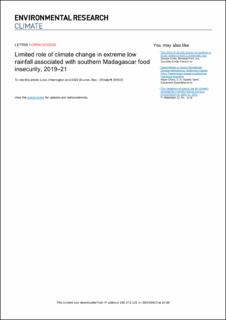| dc.contributor.author | Harrington, Luke | |
| dc.contributor.author | Wolski, Piotr | |
| dc.contributor.author | Pinto, Izidine | |
| dc.contributor.author | Ramarosandratana, Anzel`a Mamiarisoa | |
| dc.contributor.author | Barimalala, Rondrotiana | |
| dc.contributor.author | Vautard, Robert | |
| dc.contributor.author | Philip, Sjoukje | |
| dc.contributor.author | Kew, Sarah F. | |
| dc.contributor.author | Singh, Roop | |
| dc.contributor.author | Heinrich, Dorothy | |
| dc.contributor.author | Arrighi, Julie | |
| dc.contributor.author | Raju, Emmanuel | |
| dc.contributor.author | Thalheimer, Lisa | |
| dc.contributor.author | Razanakoto, Thierry | |
| dc.contributor.author | Van Aalst, Maarten | |
| dc.contributor.author | Li, Sihan | |
| dc.contributor.author | Bonnet, Rémy | |
| dc.contributor.author | Yang, Wenchang | |
| dc.contributor.author | Otto, Friederike E. L. | |
| dc.contributor.author | van Oldenborgh, Geert Jan | |
| dc.date.accessioned | 2023-03-30T12:15:22Z | |
| dc.date.available | 2023-03-30T12:15:22Z | |
| dc.date.created | 2023-01-25T16:39:40Z | |
| dc.date.issued | 2022 | |
| dc.identifier.citation | Environmental Research. 2022, 1 (2), . | en_US |
| dc.identifier.issn | 0013-9351 | |
| dc.identifier.uri | https://hdl.handle.net/11250/3061178 | |
| dc.description.abstract | Southern Madagascar recently experienced a severe food security crisis, made significantly worse by well below average rainfall from July 2019 to June 2021. This exceptional drought has affected a region with high pre-existing levels of vulnerability to food insecurity (subsistence agriculture and pastoralism in the region is rain-fed only), while impacts have been compounded further by COVID-19 restrictions and pest infestations. The rainy seasons of both 2019/20 and 2020/21 saw just 60% of normal rainfall across the Grand South region and was estimated as a 1-in-135 year dry event, only surpassed in severity by the devastating drought of 1990–92. Based on a combination of observations and climate modelling, the likelihood of experiencing such poor rains in the region was not significantly increased due to human-caused climate change: while the observations and models combine to indicate a small shift toward more droughts like the 2019–2021 event as a consequence of climate change, these trends remain overwhelmed by natural variability. This result is consistent with previous research, with the Intergovernmental Panel on Climate Change (IPCC)'s Sixth Assessment Report concluding that any perceptible changes in drought will only emerge in this region if global mean temperatures exceed 2 °C above pre-industrial levels. | en_US |
| dc.language.iso | eng | en_US |
| dc.rights | Navngivelse 4.0 Internasjonal | * |
| dc.rights.uri | http://creativecommons.org/licenses/by/4.0/deed.no | * |
| dc.subject | Klimasårbarhetsanalyse | en_US |
| dc.subject | Climate vulnerability analysis | en_US |
| dc.subject | Klimaendring | en_US |
| dc.subject | Climate change | en_US |
| dc.subject | Tørke | en_US |
| dc.subject | Drought | en_US |
| dc.title | Limited role of climate change in extreme low rainfall associated with southern Madagascar food insecurity, 2019-21 | en_US |
| dc.title.alternative | Limited role of climate change in extreme low rainfall associated with southern Madagascar food insecurity, 2019-21 | en_US |
| dc.type | Peer reviewed | en_US |
| dc.type | Journal article | en_US |
| dc.rights.holder | © 2022 The Author(s) | en_US |
| dc.description.version | publishedVersion | en_US |
| cristin.ispublished | true | |
| cristin.fulltext | original | |
| cristin.qualitycode | 2 | |
| dc.identifier.doi | 10.1088/2752-5295/aca695 | |
| dc.identifier.cristin | 2114987 | |
| dc.source.journal | Environmental Research | en_US |
| dc.source.volume | 1 | en_US |
| dc.source.issue | 2 | en_US |
| dc.source.pagenumber | 22 | en_US |
| dc.subject.nsi | VDP::Matematikk og naturvitenskap: 400 | en_US |
| dc.subject.nsi | VDP::Mathematics and natural scienses: 400 | en_US |

